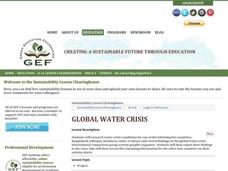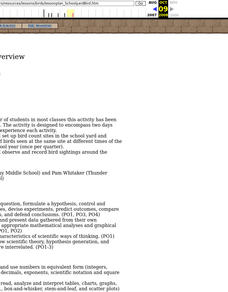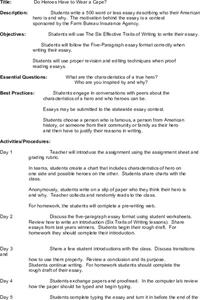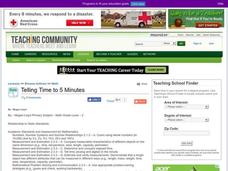Curated OER
Catalog Shopping
Learners, in groups, "shop" for eleven different items in a large mail order catalog. They locate the items and complete the order form. As a class, they discuss ways to find things more quickly.
Curated OER
How Do I Get There? Planning a Safe Route to School
One much-needed skill for young learners is direction giving. Have your class plan and draw a safe route for them to travel from home to school. They will also draw places and items that are in between home and school in order to build a...
Curated OER
BEETLES: The Coming Out
Students design an experiment to test the variables involved in the hatching of the Bruchid beetle.
Curated OER
Character Traits
Sixth graders explore details from a story to develop ideas and opinions about character traits. Using a Smart Board, 6th graders create a chart explaining the character's action and traits. In groups, students discuss and describe...
Curated OER
Character Traits
Using a three-column chart labeled "Character," "Action," and "Trait," pupils analyze the traits of several characters from a short story. The lesson is designed for a SMART board, but a teacher could easily do the lesson without the...
Curated OER
George Winter Lesson Plan 3
Bring language arts and U.S. history together in this lesson, which prompts middle and high schoolers to gather biographical information about Abraham Lincoln. They compare and contrast information written about his childhood and discuss...
Curated OER
A Feature Presentation - Geographic Landforms
Students investigate, identify and compare the various geographic terms that can be used to describe the landforms occurring in the Hawaiian islands.
Curated OER
Global Water Crisis
Assign ecologists one of five countries that struggle with access to clean water. They research the water crisis in that country and then present information to classmates. A handout was designed for each country, and a worksheet on...
Curated OER
Mark Twain and Huckleberry Finn Introductory Lessons
“What is the role or function of controversial art? And, should children, our children, be required—forced—to study certain works they may find painful or humiliating or offensive?” Robert Zalisk’s question, found in his article, “Uproar...
Achievement Strategies
CCSS Unit Design Template for Art
Art classes, like any lab class, require extensive preplanning and set-up time. Use this planning template in the quiet before the storm to identify the equipment and materials that will be needed, the procedures and processes...
Curated OER
Schoolyard Bird Project
Students observe and count bird sightings around their schoolyard throughout the school year.
Curated OER
Aerosol Lesson: Science - Graphing SAGE II Data
Students examine and plot atmospheric data on bar graphs.
Curated OER
Improving Deductive Reasoning Skills
Students develop a strategy list for problem solving by working with different types of problems. They recognize problems that may be solved using deductive reasoning and solve deductive reasoning problems.
Curated OER
Mapping Perceptions of China
Pupils discuss what types of things are included on a map. They compare and contrast maps of China with a map they create and practice using different types of maps. They write analysis of their classmates maps.
Curated OER
Total English Elementary: The Best Thing is...
Given two nouns separated by an adjective, learners create eight sentences using the adjective in comparative form. Example: Jamaica/hot/UK, which becomes Jamaica is hotter than the UK. They then write the superlative form of eight...
Curated OER
Food Labels in the Classroom
Students study the nutritional information on food labels and become familiar with the basic dietary needs of the human body. They write letters to food companies.
Curated OER
School Yard Waste
Fourth graders examine the types of garbage that they collect on the playground. They collect the information in a spreadsheet and create a graph that displays the number of types of trash found. They design and monitor a playground...
Curated OER
What's For Dinner?
Eighth graders discover how the location of restaurants affects the future location of different restaurants. Using a fictionous town, they map the locations of all current restaurants and analyze the data to determine what type of...
Curated OER
Do Heroes Have to Wear a Cape?
Young writers choose a person from American history, their community, or their family to use as the subject of a persuasive essay. The process begins with a discussion of the characteristics of a hero, the completion of a prewriting web,...
Curated OER
Describing the Planets
Young Spanish language learners review the names of each planet. Then, in pairs, they work to complete the chart provided. What is the composition of each planet? What is the color? They learn how to describe the planets.
Curated OER
Telling Time to 5 Minutes
In this second grade lesson your class will practice telling time. The goal is to tell time to five minutes using an analog clock. Your young students count by 5 minute intervals and discuss elapsed time.
Curated OER
Entertainment During the American Revolution
What do people do for fun around here? Explore colonial period games, toys, and life with a look at entertainment during the American Revolution. Discover the games, sports, and songs that were popular during the time of the Revolution.
Curated OER
Paying for Crime
Learners participate in activties examining ratios and proportions. They use graphs to interpret data showing the government's budget for prisons. They present what they have learned to the class.
Curated OER
Pond Theme Unit
In this pond theme instructional activity learners research facts on pond life. Students complete comprehension questions, crosswords, word search, and math puzzles. Learners write a short report.

























